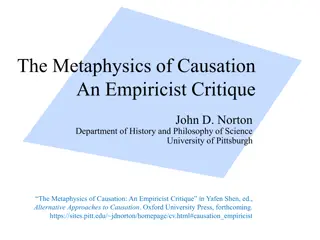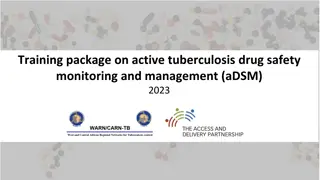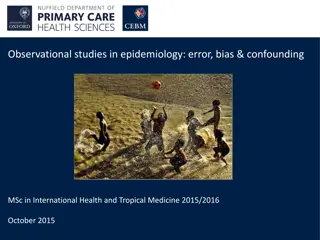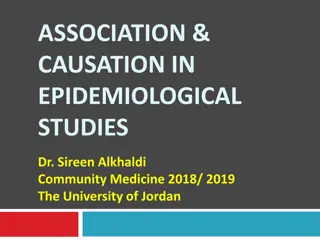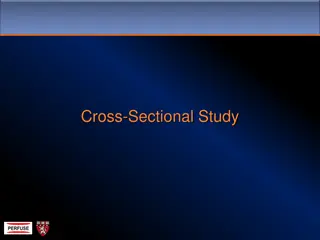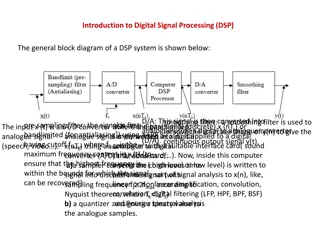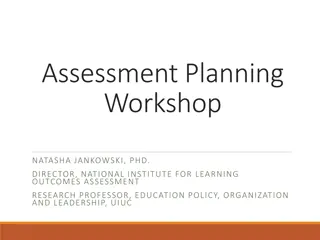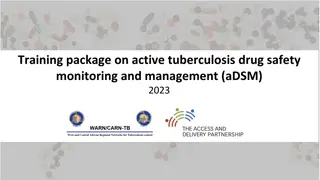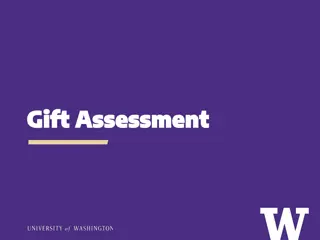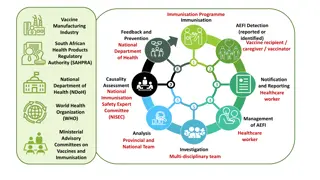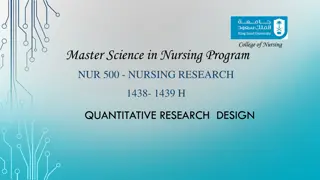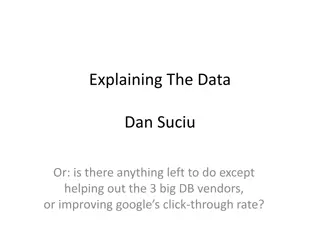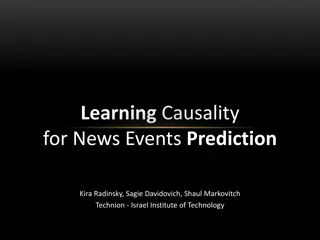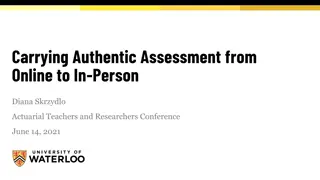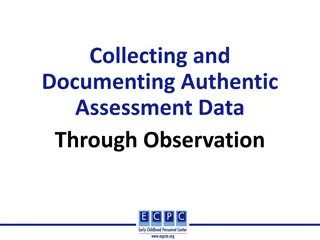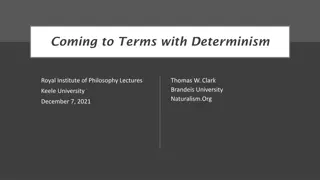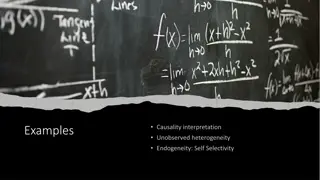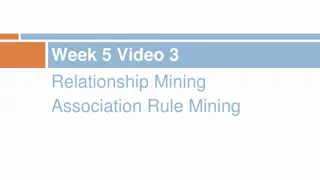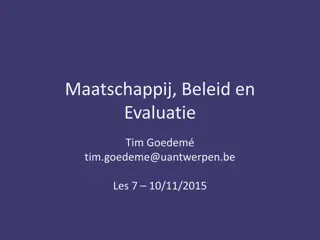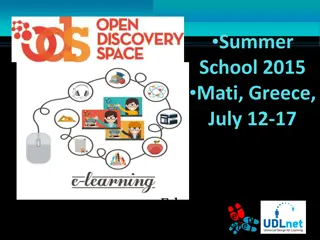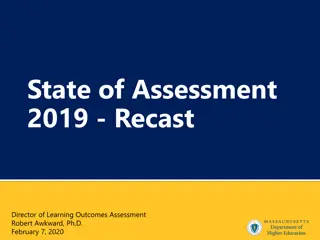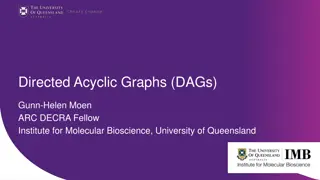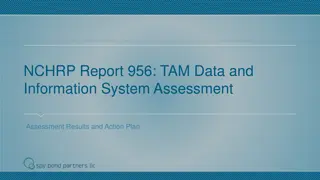Ethical Considerations in AI: Representation, Bias, and Fairness
Exploring the ethical dimensions of artificial intelligence (AI) reveals the unique position AI systems hold in behaving ethically. From causality to interpretability, bias, and privacy concerns, this discussion sheds light on the importance of ethical considerations in AI development and implementa
1 views • 25 slides
Understanding Quantitative Research Designs in Health Research
Quantitative research designs play a crucial role in health research, offering various methodologies like experimental and observational designs. Observational designs are commonly used and can establish associations but not causality. Longitudinal designs track outcomes over time, providing valuabl
3 views • 25 slides
Sheffield Early Help Assessment Form Update and Integration with Extended Support Plan
Sheffield has introduced an updated Early Help Assessment form to streamline the assessment process within the Early Help System. This new form combines the Early Help Assessment with the Extended Support Plan, aligning various assessment tools and referral forms into one comprehensive document. The
5 views • 22 slides
Critique of Causal Metaphysics and Empiricism
In this content, the author critiques the metaphysics of causation from an empiricist perspective, exploring the limitations of empiricism in understanding the contingent truths of the world. It discusses causal antifundamentalism, various forms of skepticism, including Humean skepticism, and challe
4 views • 55 slides
Active Tuberculosis Drug Safety Monitoring and Management Training Package 2023
This training package focuses on the safety monitoring and management of active tuberculosis drugs, specifically emphasizing causality assessment in determining adverse reactions. Participants will learn about assessing the likelihood of TB medicines causing adverse events, attributing relationships
3 views • 17 slides
Enhancing Language Learning Through Peer Assessment
Explore the benefits of peer assessment as a valuable tool for language learning, comparing it with self-assessment. Discover the components and challenges of self-assessment, along with the potential of peer assessment to improve accuracy and promote self-regulation. Gain insights into what peer as
3 views • 29 slides
Overview of DSW End Point Assessment Team Leader Level 3
DSW End Point Assessment Team Leader Level 3 provides a clear understanding of the assessment process, ensuring individuals comprehend why and when it occurs, responsibilities involved, and how DSW supports them. It covers topics such as what End Point Assessment entails, assessment design and deliv
1 views • 18 slides
Understanding Observational Studies in Epidemiology
Delve into the realm of observational studies in epidemiology, exploring concepts such as error, bias, and confounding. Discover the significance of various study designs, from case reports to prospective cohort studies, in elucidating associations and establishing causality in non-communicable dise
0 views • 58 slides
Understanding Association and Causation in Epidemiological Studies
Exploring the concepts of association and causation in epidemiological studies, this content delves into the complexities of determining if exposure leads to disease risk. It discusses different types of associations, such as spurious, indirect, and direct causal associations, illustrating the chall
5 views • 43 slides
Understanding Cross-Sectional Studies: Overview, Strengths, and Weaknesses
Cross-sectional studies are observational study designs that capture data from a population at a specific point in time. This snapshot approach allows for the simultaneous measurement of outcomes and exposures without follow-up. While quick and cost-effective, these studies have limitations such as
1 views • 14 slides
Understanding Chronology in the Victorian Curriculum History
Chronology is essential in historical reasoning, providing structure for organizing historical thought. The Victorian Curriculum History emphasizes the sequencing of events to analyze causality, continuity, and change, enabling students to develop explanatory narratives about the past.
1 views • 35 slides
Understanding Assessment in Medical Education
Exploring the concepts of assessment in medical education, including defining assessment, types of assessment, reliability, validity, and aligning assessment methods with intended learning outcomes. The importance of constructive alignment and the impact of assessment on learning outcomes are also d
1 views • 12 slides
Assessment Matters in Sociology: Enhancing Learning Through Evaluation
Explore the significance of assessment in sociology education, focusing on key questions to evaluate current assessment procedures, review individual course assessments, and develop strategies to enhance student learning outcomes. Delve into the centrality of assessment in the learning process, with
1 views • 15 slides
Understanding Digital Signal Processing (DSP) Systems: Linearity, Causality, and Stability
Digital Signal Processing (DSP) involves converting signals between digital and analog forms for processing. The general block diagram of a DSP system includes components like D/A converters, smoothing filters, analog-to-digital converters, and quantizers. DSP systems can be classified based on line
1 views • 12 slides
Scalable Causal Consistency for Wide-Area Storage with COPS
This paper delves into the importance of scalable causal consistency for wide-area storage with the COPS system. It explores desired properties such as availability, low latency, partition tolerance, and scalability within data centers. The document discusses the challenges of achieving consistency
0 views • 41 slides
Insights into Managing Assessment in the Classroom by Assessment Research Group
Explore the importance of standards and assessment in education through the lens of the Assessment Research Group. Gain valuable perspectives on curriculum delivery, understanding the assessment system, learner assumptions, task parameters, and more. Discover how language, structure, and agency play
2 views • 25 slides
Workshop on Assessment Planning by Dr. Natasha Jankowski
Dr. Natasha Jankowski, Director of the National Institute for Learning Outcomes Assessment, conducts a workshop focusing on effective use of assessment data to enhance undergraduate education. The workshop covers areas like evaluating assessment plans, program learning outcomes, and assessment rubri
0 views • 30 slides
Building Capacity for Active Tuberculosis Drug Safety Monitoring and Management
This training package focuses on developing capacity for signal detection and causality assessment in the management of active tuberculosis drug safety. Key steps include creating a national coordinating mechanism, defining roles and responsibilities, training staff, and consolidating data electroni
0 views • 12 slides
Enhancing Understanding through Assessment in Educational Design Workshop
Learn and collaborate on assessment practices in education design at the "Understanding by Design Assessment Focus" workshop. The agenda includes sessions on summative and formative assessment, feedback, reporting, and more. Engage in activities like generating questions, finding destination partner
1 views • 76 slides
Institutional Assessment Planning Workshop Feedback and Insights
Feedback and insights from a recent institutional assessment planning workshop led by Dr. Mark Nicholas at FSU S. Warren Conference Center & Inn. Participants provided feedback on the usefulness of the content, presenter knowledge, ability to develop assessment plans, post-training assessment knowle
1 views • 9 slides
Understanding Higher Education Assessment: The Complete Guide
Higher education assessment involves a systematic process of collecting, reviewing, and utilizing information to improve student learning and development. This guide covers the assessment cycle, learning outcomes, the mission behind assessment in higher education, what assessment is and is not, reas
1 views • 36 slides
Understanding Gift Assessment Process at University of Washington
The Gift Assessment Process at University of Washington involves applying a 5% assessment to select current-use gifts over $1,000 and under $5 million. This assessment supports the university's advancement efforts and institutional priorities by transferring 5% of eligible contributions to the Provo
1 views • 5 slides
Overview of Environmental Impact Assessment and Strategic Environmental Assessment Directives
Environmental Impact Assessment (EIA) and Strategic Environmental Assessment (SEA) play crucial roles in evaluating the impact of planned activities on the environment. This content delves into the concept, origins, development, and key elements of environmental assessment, discussing the legal fram
2 views • 35 slides
Understanding Immunisation Programme and AEFI Detection in Vaccine Manufacturing Industry
The content delves into various aspects of immunisation programmes, including AEFI detection, causality assessment, reporting procedures, and implications for COVID-19 vaccination. It explores different categories of reactions following immunisation, such as quality defect-related, product-related,
0 views • 5 slides
Understanding Quantitative Research Designs in Nursing
Delve into the world of quantitative research in nursing, exploring different research designs and the concept of causality. Learn about experimental, quasi-experimental, and non-experimental designs, as well as the characteristics of experimental design like manipulation, control, and randomization
0 views • 22 slides
Challenges in Explaining the Data: A Research Agenda for the Future
Explore the complexities of explaining data, from understanding causality to interactive processes and visualizations. Judea Pearl's work on causality and Halpern's foundational research shape the emerging science of explaining data, highlighting the limitations and challenges faced by data analysts
0 views • 5 slides
Institutional Assessment and Effectiveness Workshop Achievements at SUNY Oneonta
The Office of Institutional Assessment and Effectiveness at SUNY Oneonta has made significant progress in developing assessment protocols and processes, leading to a culture of assessment. This includes completing planning and assessment cycles, establishing objectives and procedures, and aligning u
1 views • 16 slides
Understanding Causality in News Event Prediction
Learning about the significance of predictions in news events and the process of causality mining for accurate forecasting. The research delves into problem definition, solution representation, algorithms, and evaluation in event prediction. Emphasis is placed on events, time representation, predict
0 views • 36 slides
Oregon Department of Education Assessment and Accountability Resources
Access important information on assessments, accountability, and reporting from the Oregon Department of Education. Find resources on updating assessment records, accessing student scores, and staying informed about assessment requirements for the 2023-24 academic year. Explore links for assessment
0 views • 55 slides
Oregon Department of Education - Assessment Resources and Updates
Explore the Assessment Record Updating Application (ARUA), Accountability Warehouse Extract (AWE), Secure Assessment Reports, and other important tools and information provided by the Oregon Department of Education for assessment data owners, analysts, and partners. Access links for assessment admin
0 views • 54 slides
Enhancing Teaching Assessment for Actuarial Education
Exploring the transition of assessment practices from online to in-person settings, this presentation by Diana Skrzydlo at the Actuarial Teachers and Researchers Conference delves into the purpose of assessment, key principles, and activities for effective evaluation. Discover insights on diagnostic
0 views • 10 slides
Authentic Assessment through Systematic Observation: Best Practices
Explore the process of authentic assessment through systematic observation in early childhood education. Learn about collecting, documenting, and interpreting assessment data using evidence-based practices and technology. Discover the importance of working collaboratively with families and professio
0 views • 53 slides
Exploring Determinism: Insights on Free Will and Causality
Delve into the philosophical discourse on determinism with a critical examination of free will, agency, and the implications of causality. Discover how leading thinkers challenge the conventional notions of choice and explore the complexities of human behavior in light of scientific revelations.
0 views • 26 slides
Exploring Causal Inference Models and Data-Driven Methods
Delve into various examples of causal inference models and data analysis methods, from traditional statistical models to cutting-edge data-driven approaches like AI/ML. Understand the challenges of causality interpretation and explore the trade-offs between data size, prediction, and causality in di
0 views • 9 slides
Exploring Association Rule Mining in Data Analysis
Association rule mining involves automatically discovering simple if-then rules within a dataset. This process can unveil interesting relationships and patterns, leading to generating hypotheses for further study and finding unexpected connections. While association rules imply causality by their if
0 views • 46 slides
Understanding Causality in Social Policy: A Comprehensive Overview
This content delves into the concept of causality in social policy, focusing on different types of causal relationships and frameworks for causal analysis. It explores the importance of understanding causality for evidence-based policy making and evaluation, touching on key questions and relevant ba
0 views • 55 slides
Innovative Educational Scenario for Teaching Principles of Dynamics
This educational scenario focuses on the principles of dynamics, emphasizing the causality in physics through inductive teaching methods. Students are engaged in experiments to understand the concept of motion and causality in a multidisciplinary approach involving maths, science, ICT, psychology, a
0 views • 15 slides
Assessment Practices in Higher Education Institutions
Dive into the state of assessment for the year 2019, featuring insights on hosting assessment days, establishment of assessment committees, implementation of institutional and program learning outcomes, appointment of a Director of Assessment, compensation for faculty members focusing on assessment,
0 views • 8 slides
Directed Acyclic Graphs (DAGs)
Explore the significance of Directed Acyclic Graphs (DAGs) in comprehending data structures, addressing issues like bias, loss to follow up, and missing data impacts in studies. Gain insights into key concepts, nodes, arrows, causality, associations, causal structures, and the role of confounders. E
0 views • 26 slides
NCHRP Report 956 TAM Data and Information System Assessment
This content provides an overview of NCHRP Report 956 focusing on the TAM data and information system assessment results and action plan. It includes details on assessment outcomes, recommendations, implementation action plans, and tools for self-assessment and improvement methodology. The content a
0 views • 21 slides



